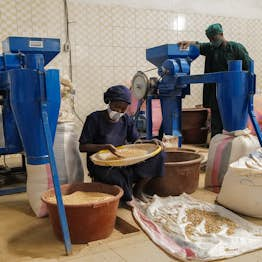Introduction
Development cooperation relations between Luxembourg and Mali began in 1998 with the signing of a general cooperation agreement, before Mali became a Luxembourg Development Cooperation partner country in 1999.
Read more
In view of the worrying humanitarian situation and in order to ensure the continuity of Luxembourg’s long-standing commitments in Mali, in 2022 Luxembourg extended its existing transition strategy in order to continue to offer opportunities to the population. With the presidential election scheduled for March 2024 and the prospect of a return to a constitutional system, an extension of the transition strategy, covering the period from 1 January 2023 to 31 December 2024, was granted in August 2022. This will involve the extension of bilateral programmes in the fields of training and labour market integration, rural development and food security as well as strengthening the resilience of rural communities.
The rural development programme mainly intervenes in the profitable rice, fonio and sesame industries by increasing their productivity, sustainability and profitability, in order to sustainably boost sources of income and food security for those living in Mali. In the field of training and integration into the job market, the Luxembourg Development Cooperation seeks to broaden the range of high-quality vocational training on offer to enable young people and women to acquire skills that are suited to the employment market and thus to promote their access to income-generating activities. In total, 2 148 young people from family farms have been identified and constitute the primary target group for the receipt of advice from the integration support structures.
The support programme in agro-pastoral sectors in the regions of Ségou and Sikasso, financed jointly with Switzerland with a budget of EUR 16 million, is designed to help increase the incomes of family agro-pastoral farms active in the local milk and potato sectors, by improving productivity and employability and by bringing together operators from the public sector, the private sector and civil society.
Within the framework of multilateral cooperation, Luxembourg supports the “Mali Youth Entrepreneurship” programme implemented by the United Nations Development Programme (UNDP) (2021 – 2023, EUR 2.25 million), which aims to train 10 000 young people in entrepreneurship and to support them to set up their businesses. The implementation of the UNDP support programme for reforms and elections in Mali (2021 – 2023, EUR 200 000) continued in 2022.
In response to the growing humanitarian needs in Mali, Luxembourg contributed EUR 3 571 215 to the humanitarian activities of its partners in the country in 2022, in particular by providing support to ICRC humanitarian operations in Mali, the World Food Programme’s (WFP) “School feeding” and “UN Humanitarian Air Service” (UNHAS) programmes, as well as the operations of the Belgian Doctors of the World organisation in Mali.
Finally, six Luxembourgish NGOs (Caritas, the Luxembourg Red Cross, Bridderlech Deelen Foundation, Fondation Raoul Follereau, Handicap International and SOS Faim) have run projects in 2022 in Mali in the sectors of water and sanitation, education and vocational training, rural and agricultural development and the elimination of violence against women.
Development of PDA
Political instability and the deterioration of the security situation, especially in the north of the country, have aggravated an already very difficult humanitarian situation. In Mali, as in Niger, Burkina Faso, Senegal and Cabo Verde, Luxembourg also made additional resources available in 2022 to combat food insecurity. A decision was taken to contribute to the School Feeding Support Project (PAAS) implemented by the WFP (EUR 3 million) and to two existing projects set up by Caritas Luxembourg in collaboration with Caritas Switzerland, with the main objective of strengthening food assistance for the most vulnerable populations at risk of food insecurity (EUR 500 000).
Reference data
- Population (MIO): 21,9
- GNI (per resident): 2.220
- Human Development Index (HDI): 186/191
- Life expectancy: 59
